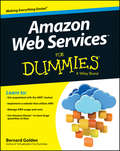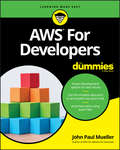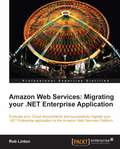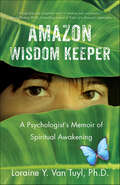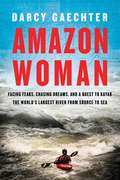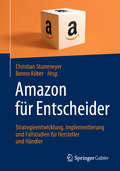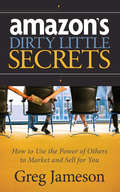- Table View
- List View
Amazon Web Services
by Gary P. Pisano Robert S. Huckman Liz KindConsiders the development of Amazon Web Services (AWS), a division of Amazon.com, Inc., specializing in the provision of web-based storage and computing services to web developers. The case focuses on the issues facing Andy Jassy, the head of AWS, in 2008 as AWS faces increased competition from established technology giants, such as Google, Microsoft, and IBM. Students are asked to consider whether entry into web services by Amazon, which had established its brand in retail, represented a prudent move by the company. The case provides an opportunity to highlight the benefits of AWS' variable pricing for developers and to determine where overlaps exist between Amazon's core retailing business and AWS. Students are also provided with an opportunity to discuss operational diversification and its limits within the AWS context.
Amazon Web Services Bootcamp: Develop a scalable, reliable, and highly available cloud environment with AWS
by Sunil GulabaniThis fast-paced guide will quickly enhance your skills to develop a highly scalable Cloud environmentKey FeaturesEfficiently build a highly scalable and reliable cloud environment for your applications with AWSLeverage the various AWS components and services to build a secure, reliable, and robust environment to host your applications onThis quick-start guide will quickly enhance your skills to develop highly scalable servicesBook DescriptionAWS is at the forefront of Cloud Computing today. Businesses are adopting AWS Cloud because of its reliability, versatility, and flexible design. The main focus of this book is teaching you how to build and manage highly reliable and scalable applications and services on AWS. It will provide you with all the necessary skills to design, deploy, and manage your applications and services on the AWS cloud platform. We’ll start by exploring Amazon S3, EC2, and so on to get you well-versed with core Amazon services. Moving on, we’ll teach you how to design and deploy highly scalable and optimized workloads. You’ll also discover easy-to-follow, hands-on steps, tips, and recommendations throughout the book and get to know essential security and troubleshooting concepts. By the end of the book, you’ll be able to create a highly secure, fault tolerant, and scalable environment for your applications to run on.What you will learnFind out about IAM to access AWS services securelyExplore EC2 (virtual server) and scale up/down your application based on heavy trafficLearn about unlimited data storage service S3 and host a static website within minutesGet to grips with Relational Databases and NoSQL databases under the AWS ecosystemUnderstand the caching mechanismGet to know about notifications service and monitor AWS servicesSecure and troubleshoot your AWS architectureWho this book is forThis book is for IT professionals and system administrators looking to design, deploy, and manage your applications and services on the AWS cloud platform. It’s also ideal for developers looking to build highly scalable cloud-based services. A basic understanding of AWS would be beneficial.
Amazon Web Services For Dummies
by Bernard GoldenCreate dynamic cloud-based websites with Amazon Web Services and this friendly guide!As the largest cloud computing platform in the world, Amazon Web Services (AWS) provides one of the most popular web services options available. This easy-to-understand guide is the perfect introduction to the Amazon Web Services platform and all it can do for you. You'll learn about the Amazon Web Services tool set; how different web services (including S3, Amazon EC2, and Amazon Flexible Payments) and Glacier work; and how you can implement AWS in your organization.Explains how to use Amazon Web Services to store objects, take payments, manage large quantities of data, send e-mails, deploy push notifications, and more from your websiteDetails how AWS can reduce costs, improve efficiency, increase productivity, and cut down on expensive hardware investments - and administrative headaches - in your organizationIncludes practical examples and helpful step-by-step lists to help you experiment with different AWS features and create a robust website that meets your needsAmazon Web Services For Dummies is exactly what you need to get your head in the cloud with Amazon Web Services!
Amazon Web Services for Developers For Dummies
by John Paul MuellerEverything you need to get running with IaaS for Amazon Web Services Modern businesses rely on Infrastructure-as-a-Service (IaaS)—a setup in which someone else foots the bill to create application environments—and developers are expected to know how to write both platform-specific and IaaS-supported applications. If you're a developer who writes desktop and web applications but have little-to-no experience with cloud development, this book is an essential tool in getting started in the IaaS environment with Amazon Web Services. In Amazon Web Services For Developers For Dummies, you'll quickly and easily get up to speed on which language or platform will work best to meet a specific need, how to work with management consoles, ways you'll interact with services at the command line, how to create applications with the AWS API, and so much more. Assess development options to produce the kind of result that's actually needed Use the simplest approach to accomplish any given task Automate tasks using something as simple as the batch processing features offered by most platforms Create example applications using JavaScript, Python, and R Discover how to use the XML files that appear in the management console to fine tune your configuration Making sense of Amazon Web Services doesn't have to be as difficult as it seems—and this book shows you how.
Amazon Web Services for Mobile Developers: Building Apps with AWS
by Abhishek MishraA practical, real-world introduction to AWS tools and concepts Amazon Web Services for Mobile Developers: Building Apps with AWS presents a professional view of cloud computing and AWS for experienced iOS/Android developers and technical/solution architects. Cloud computing is a rapidly expanding ecosystem, and working professionals need a practical resource to bring them up-to-date on tools that are rapidly becoming indispensable; this book helps expand your skill set by introducing you to AWS offerings that can make your job easier, with a focus on real-world application. Author and mobile applications developer Abhishek Mishra shows you how to create IAM accounts and try out some of the most popular services, including EC2, Lambda, Mobile Analytics, Device Farm, and more. You'll build a chat application in both Swift (iOS) and Java (Andoid), running completely off AWS Infrastructure to explore SDK installation, Xcode, Cognito authentication, DynamoDB, Amazon SNA Notifications, and other useful tools. By actually using the tools as you learn about them, you develop a more intuitive understanding that feels less like a shift and more like a streamlined integration. If you have prior experience with Swift or Java and a solid knowledge of web services, this book can help you quickly take your skills to the next level with a practical approach to learning that translates easily into real-world use. Understand the key concepts of AWS as applied to both iOS and Android developers Explore major AWS offerings for mobile developers, including DynamoDB, RDS, EC2, SNS, Cognito, and more Learn what people are talking about when they use buzzwords like PaaS, IaaS, SaaS, and APaaS Work through explanations by building apps that tie into the AWS ecosystem Any job is easier with the right tools, and Amazon Web Services for Mobile Developers: Building Apps with AWS gets you acquainted with an ever-expanding toolkit for mobile app development.
Amazon Web Services in Action
by Michael Wittig Andreas WittigSummaryAmazon Web Services in Action, Second Edition is a comprehensive introduction to computing, storing, and networking in the AWS cloud. You'll find clear, relevant coverage of all the essential AWS services you to know, emphasizing best practices for security, high availability and scalability.Foreword by Ben Whaley, AWS community hero and author.Purchase of the print book includes a free eBook in PDF, Kindle, and ePub formats from Manning Publications.About the TechnologyThe largest and most mature of the cloud platforms, AWS offers over 100 prebuilt services, practically limitless compute resources, bottomless secure storage, as well as top-notch automation capabilities. This book shows you how to develop, host, and manage applications on AWS.About the BookAmazon Web Services in Action, Second Edition is a comprehensive introduction to deploying web applications in the AWS cloud. You'll find clear, relevant coverage of all essential AWS services, with a focus on automation, security, high availability, and scalability. This thoroughly revised edition covers the latest additions to AWS, including serverless infrastructure with AWS Lambda, sharing data with EFS, and in-memory storage with ElastiCache. What's insideCompletely revised bestsellerSecure and scale distributed applicationsDeploy applications on AWSDesign for failure to achieve high availabilityAutomate your infrastructureAbout the ReaderWritten for mid-level developers and DevOps engineers.About the AuthorAndreas Wittig and Michael Wittig are software engineers and DevOps consultants focused on AWS. Together, they migrated the first bank in Germany to AWS in 2013.Table of ContentsPART 1 - GETTING STARTED What is Amazon Web Services? A simple example: WordPress in five minutesPART 2 - BUILDING VIRTUAL INFRASTRUCTURE CONSISTING OF COMPUTERS AND NETWORKING Using virtual machines: EC2 Programming your infrastructure: The command-line, SDKs, and CloudFormation Automating deployment: CloudFormation, Elastic Beanstalk, and OpsWorks Securing your system: IAM, security groups, and VPC Automating operational tasks with Lambda PART 3 - STORING DATA IN THE CLOUDStoring your objects: S3 and Glacier Storing data on hard drives: EBS and instance store Sharing data volumes between machines: EFS Using a relational database service: RDSCaching data in memory: Amazon ElastiCache Programming for the NoSQL database service: DynamoDB PART 4 - ARCHITECTING ON AWSAchieving high availability: availability zones, auto-scaling, and CloudWatch Decoupling your infrastructure: Elastic Load Balancing and Simple Queue Service Designing for fault tolerance Scaling up and down: auto-scaling and CloudWatch
Amazon Web Services in Action, Third Edition: An in-depth guide to AWS
by Andreas WittigMaster essential best practices for deploying and managing applications on Amazon Web Services. This revised bestseller is packed with techniques for building highly available and scalable architectures and automating deployment with Infrastructure as Code. Leverage globally distributed data centers to launch virtual machines with EC2 Store and archive large volumes of data with EBS, S3, and EFS Persist and query data with highly available and scalable database systems with RDS and DynamoDB Enhance performance with caching data in-memory with ElastiCache and MemoryDB Use Infrastructure as Code to automate your cloud infrastructure Secure workloads running in the cloud with VPC and IAM Build fault-tolerant web applications with ALB and SQS Automate common sysadmin tasks with Lambda, CLI, and SDK Build cloud-native applications based on containers with AppRunner, ECS, Fargate Thousands of developers have chosen Amazon Web Services in Action: An in-depth guide to AWS to help them succeed with the AWS cloud. Readers love this all-practical handbook for its complete introduction to computing, storage, and networking, along with best practices for all core AWS services. This revised third edition features new chapters on containerization, along with a variety of AWS innovations. You&’ll also learn how automating your infrastructure with IAC is a game changer for your cloud deployment, delivering a massive boost to efficiency and quality. About the Technology Amazon Web Services, the leading cloud computing platform, offers customers APIs for on-demand access to computing services. Rich in examples and best practices of how to use AWS, this Manning bestseller is now released in its third, revised, and improved edition. About the Book In Amazon Web Services in Action, Third Edition: An in-depth guide to AWS, the Wittig brothers give you a comprehensive, practical introduction to deploying and managing applications on the AWS cloud platform. With a sharp focus on the most important AWS tasks and services, they will save you hours of unproductive time. You&’ll learn hands-on as you complete real-world projects like hosting a WordPress site, setting up a private cloud, and deploying an app on containers. What&’s Inside Leverage globally distributed data centers to launch virtual machines Enhance performance with caching data in-memory Secure workloads running in the cloud with VPC and IAM Build fault-tolerant web applications with ALB and SQS About the Reader Written for mid-level developers, DevOps or platform engineers, architects, and system administrators. About the Author Andreas Wittig and Michael Wittig are software engineers and consultants focused on AWS. Together, they migrated the first bank in Germany to AWS in 2013.
Amazon Web Services: Migrating your .NET Enterprise Application
by Rob LintonThis practical, step-by-step guide follows the process of moving a sample Enterprise .NET application to the Amazon Cloud.Companies that have designed, developed, and hosted applications based on the Microsoft .NET technology stack should not miss out on this book. If you are looking to expand into using the vast array of services available on the Amazon Cloud but are unsure how to proceed, then this will help to get you on your way.Administrators or developers managing such applications should have basic experience of the platform and the web servers that thay are intending to move to Amazon. No knowledge of AWS is required.
Amazon Wisdom Keeper: A Psychologist's Memoir of Spiritual Awakening
by Loraine Y. Van TuylWith captivating lyricism, Amazon Wisdom Keeper transports us into the multicultural upbringing and transformation of Loraine Van Tuyl, a graduate psychology student and budding shamanic healer who’s blindsided by startling visions, elusive drumming, and her inseverable mystical ties to the Amazon rainforest of her native Suriname. Is she in the wrong field, or did her childhood dreams, imaginary guides, and premonitions somehow prepare her for these challenges? Did Suriname’s military coup and her family’s uprooting move to the US rob her from all that she knew and loved at thirteen to help reveal her soul’s purpose, or is she losing her mind by entertaining far-fetched questions and hunches that can’t be answered or proven—like wondering if her perplexing life story is shedding light on the double-binds in her field on purpose, and suspecting that her soul’s daunting blue print was plotted long before she was even born? Van Tuyl wrestles with these questions and more as she embarks upon her risky quest, enduring test upon test in search of her true self and calling while enrolled in a rigorous academic program that regards intuitive healing methods as unscientific—and even unethical.
Amazon Woman: Facing Fears, Chasing Dreams, And My Quest To Kayak The Largest River From Source To Sea
by Darcy GaechterAn extraordinary and inspiring chronicle of one woman’s harrowing journey to become the first female to kayak the entire Amazon River. Part memoir, part feminist manifesto, Amazon Woman shows what incredible feats we are capable of and will encourage people, especially women, across all backgrounds and ages to find the courage and strength to live the life they’ve imagined. This 148-day journey began on Darcy Gaechter’s 35th birthday. She sold her successful outdoor adventure business, upsetting her partner and boyfriend of twelve years and getting them both fired in the process. The emotional waters that would fester and erupt on the ensuing journey was often more challenging to navigate than the mighty river itself. With blistering lips and irradiated fingernails, Darcy would tackle raging Class Five whitewater for twenty-five days straight, barely survived a dynamite-filled canyon being prepared for a new hydroelectric plan. She and her two companions would encounter illegal loggers, narco-traffickers, murderous Shining Path rebels, and ruthless poachers in the black market trade in endangered species. They would plead for mercy at the hands of the murderous Ashaninka people who were convinced that they had come to steal their children’s organs. In a desperate attempt meant to give her some pretense of control, Darcy even cut off all her hair before entering Peru’s notoriously dangerous “Red Zone” in hopes of passing for a boy and being seen as less of a target. At once a heart-pounding adventure and a celebration of pushing personal limits, Amazon Woman speaks to all of us feeling trapped by our desk-bound, online society. This a story of finding the courage and strength to challenge nature, cultures, social norms, and oneself.
Amazon and the Concrete Jungle
by Charles F Wu Ryan Lee Marie Archibald Maya Kazamel Will BegleyCase
Amazon für Entscheider: Strategieentwicklung, Implementierung und Fallstudien für Hersteller und Händler
by Christian Stummeyer Benno KöberDieses Buch unterstützt Hersteller und Händler, die für sie richtige Amazon-Marktplatz-Strategie zu entwickeln. 14 ausgewiesene Experten erläutern im Detail, wie eine erfolgreiche Implementierung auf dem Amazon Marketplace funktionieren und wie das Amazon-Ecosystem effektiv genutzt werden kann. Fallstudien aus dem B2B- und B2C-Bereich zeigen, wie Amazon-Verkaufsstrategien erfolgreich umgesetzt werden können. Trotz des enormen Marktanteils des E-Commerce-Riesen schenken viele Unternehmen diesem Verkaufskanal immer noch nicht die nötige Aufmerksamkeit. Dies gilt nicht nur für den B2C-Markt, sondern auch im B2B-Umfeld, für das das Unternehmen aus Seattle unter Amazon Business die Möglichkeit bietet, schnell und unkompliziert zu verkaufen. In diesem Buch erhalten Sie Antworten auf Fragen wie „Amazon – ja oder nein?“ oder „Wie sieht eine erfolgversprechende Amazon-Vertriebsstrategie aus?“ sowie umfangreiches Entscheider-Wissen: von der Gestaltung einer verkaufsstarken Produktdetailseite über relevante Logistikanforderungen bis hin zu Markenschutz und rechtlichen Aspekten.Die ThemenAmazon verstehen und passgenaue Strategien entwickelnExemplarische Amazon-Strategien (Seller defensiv, Seller offensiv, Vendor B2C-B2B)Optimierung der ProduktdetailseitenEinsatz von Amazon Sponsored AdsProduktbewertungen auf AmazonGesetzliche Anforderungen und Amazon-RichtlinienLogistikkompetenz als wesentlicher TreiberProdukt- und Markenschutz auf AmazonAmazon Readiness: Prozesse, Systeme und Organisation für Profitabilität und SkalierbarkeitDas Ökosystem rund um AmazonB2B- und B2C-Fallstudien„Wie halte ich es mit Amazon? Das ist und bleibt eines der wichtigsten Strategiethemen für Handel und Industrie. Deshalb kommt „Amazon für Entscheider“ zur richtigen Zeit. Es beleuchtet die Amazon-Welt aus unterschiedlichsten Perspektiven und liefert so wertvolle Einsichten, indem es die Möglichkeiten gleichermaßen in Theorie und Praxis untersucht. Amazon-Insider und Branchenbeobachter mit langjähriger Erfahrung schärfen den Blick auf Amazon.“Jochen Krisch, excitingcommerce.deAus dem InhaltTEIL I. AMAZON VERSTEHEN UND PASSGENAUE STRATEGIEN ENTWICKELNAmazons Masterplan (Christian Stummeyer)Das Prinzip Amazon (Benno Köber)Der E-Commerce-Treiberbaum beim Vertrieb über den Amazon Marketplace (Christian Stummeyer)Entwicklung einer Amazon-Strategie (Ralph Ch. Hübner)Plattformzeitalter: Alternativen zu Amazon (Ralph Ch. Hübner)TEIL II. ENTSCHEIDENDE ERFOLGSBAUSTEINE KONZIPIEREN UND IMPLEMENTIERENOptimierung der Produktdetailseiten und deren Reichweite auf dem Amazon Marketplace (Adrian Jaroszyński)Strategische Grundlagen für den Einsatz von Amazon Sponsored Ads (Adrian Jaroszyński)Produktbewertungen auf Amazon: Relevanz und Handlungsfelder für Unternehmen (Christian Driehaus)Gesetzliche Anforderungen, Rahmenbedingungen und Amazon Richtlinien beim Verkauf über den Amazon Marketplace (Sabine Heukrodt-Bauer)Logistik als wesentlicher Treiber des Erfolgs für und mit Amazon (Oliver Lucas)Amazon Readiness: Prozesse, Systeme und Organisation um den Amazon Marketplace profitabel und skalierbar zu bespielen (Martin Himmel)Fulfillment by Amazon (Benno Köber)Amazon Business für den B2B-Markt (Lennart Paul)Produkt und Markenschutz auf Amazon (Jochen Schäfer)Das Ökosystem rund um Amazon (Benno Köber)TEIL III. FALLSTUDIENVom Amazon Pure Player zum Multi-Channel: Fahrradzubehör von AARON (Hans Mina) Selle
Amazon in 2017
by Sunil GuptaBy 2015, Amazon had become one of the world's largest e-commerce players with nearly $90 billion in annual sales. Although its profitability had been uneven in the 20 years since its inception, its stock price had risen almost 24,000% since the company went public. During this time Amazon has spread its business across a variety of products and services that some see as unrelated. Was Amazon spreading itself too thin or were its investments positioning the company for the future?
Amazon in 2019
by Sunil GuptaAmazon launched its website in July 1995 to sell books online. Since then it has expanded into a variety of businesses that some see as unrelated. By 2019 Amazon has grown to become a digital giant with over $233 billion in annual sales but its profitability has been uneven. Has it spread itself too thin or is it positioning itself well for the future?
Amazon in 2020
by Sunil GuptaAmazon launched its website in July 1995 to sell books online. Since then it has expanded into a variety of businesses that some see as unrelated. By 2019 Amazon has grown to become a digital giant with over $233 billion in annual sales but its profitability has been uneven. Has it spread itself too thin or is it positioning itself well for the future?
Amazon in 2021
by Sunil Gupta Margaret L. RodriguezAmazon launched its website in July 1995 to sell books online. Since then it has expanded into a variety of businesses that some see as unrelated. By 2019 Amazon has grown to become a digital giant with over $233 billion in annual sales but its profitability has been uneven. Has it spread itself too thin or is it positioning itself well for the future?
Amazon in China and India
by Krishna G. Palepu Kairavi DeyAmazon has been unsuccessful in its efforts to develop a business in China. Even though Amazon was an early entrant into China's e-commerce space, its domestic rivals, especially Alibaba, created innovative business models uniquely suited for the conditions in China. Amazon's failure to adapt to the local conditions in China ultimately led to its exit from the country. Determined to learn lessons from this experience as it developed its business in India, Amazon made a number of innovations in its business model in India. By 2020, Amazon established a strong presence in India. However, the company faces a number of challenges because of changes in regulation that challenge its hybrid business model of both being a seller of its own goods and a marketplace for third party sellers, the rise of strong local rivals, and its own ambition to expand beyond top tier cities and upper middle class customers in India.
Amazon in Fashion
by John R. Wells Gabriel Ellsworth Benjamin WeinstockAccording to many analysts and industry observes, in 2018 Amazon became the largest retailer of apparel in the United States and the second largest in the world, behind Alibaba. Much of Amazon's apparel was made by third party retailers on its platform, but Amazon had been working to build its own fashion retail skills for more than 15 years, and had made a number of acquisitions to this end. Having failed to convince leading brands to sell on Amazon, the company had also launched several private label lines to boost its presence in fashion apparel. However, in 2017, it had finally convinced leading brand Nike to sell direct on its platform. President of Amazon Fashion since June 2017, Christine M. Beauchamp (Harvard Business School MBA, 1997) was contemplating next steps. Meanwhile, leading online and fast-fashion specialists such as ASOS in the UK and Inditex in Spain did not appear to have much to be concerned about. However, many traditional fashion retailers, struggling to build effective multi-channels strategies, were facing slow growth and pressure on margins. Would 2018 mark the beginning of the demise of traditional fashion retailing? What role would the bricks and mortar channel in fashion retailing play in the future? What might the future look like for the fashion industry? And what role might Amazon play in it?
Amazon's Dirty Little Secrets: How to Use the Power of Others to Market and Sell for You
by Greg JamesonMany people believe that Amazon&’s success is the direct result of a strong user shopping experience. This however is only part of the reason why Amazon is the number one ecommerce company in the world for almost two decades. The real reason behind Amazon&’s success is that they have mastered the art of getting other people to market and sell for them. From affiliate partners that drive traffic, to online reviews and ratings where customers tell other customers why they should buy a product, to getting free publicity from shows like Oprah or 60 Minutes, Amazon is the online company to emulate. &“Amazon&’s Dirty Little Secrets" will show you how you can accomplish this for your company. "Amazon&’s Dirty Little Secret" is getting others to do their marketing and sales for them. This is so powerful that Greg created an acronym using the word POWER+.P – Plenty of trafficO – Offer something for freeW – Win their trustE – Engaging experienceR – Request an action+ – additional tips & secretsAnyone engaged in Internet sales and marketing will benefit from the specific examples in this book.
Amazon's HQ2 (C): Choices
by Jan W. Rivkin Karen MillsAmazon's initial request for proposals for a second headquarters (HQ2), released in September 2017, attracted great attention and, ultimately, proposals from 238 cities and regions in North America. This case discusses the company's decision to split its HQ2 between two locations, and the ensuing response from local politicians and the public.
Amazon, Apple, Facebook, and Google
by John Deighton Leora KornfeldFour businesses had, by 2012, grown to dominate the infrastructure that all firms rely on to reach online customers. Will the balance of power among the four persist, will one take command at the expense of the other three, or are all four more vulnerable than they seem to outside forces? What are the implications for the pace at which consumers go online? Amara's Law claims that we tend to overestimate change in the short run, and underestimate it in the long run.
Amazon, Apple, Facebook, and Google 2018
by John Deighton Leora KornfeldFour businesses had, by 2012, grown to dominate the infrastructure that all firms rely on to reach online customers. Will the balance of power among the four persist, will one take command at the expense of the other three, or are all four more vulnerable than they seem to outside forces? What are the implications for the pace at which consumers go online? Amara's Law claims that we tend to overestimate change in the short run, and underestimate it in the long run.


